Based on the 2020 Census of Population and Housing (CPH), Davao del Norte had a total household population of 1,115,167 persons. Of this total, 7.3 percent or 81,023 persons were comprised of the household population from the municipality of Kapalong.
Out of the 81,023 household population of Kapalong in 2020; 41,731 (51.51%) were males while 39,292 (48.49%) were females. By age group, 27,970 (34.52%) were under 15 years of age (young dependents).
On the other hand, persons aged 15 to 64 years old (working-age or economically-active population) totaled to 49,970 (61.06%), while those in age groups 65 years old and over (old dependents) comprised the remaining 3,583 (4.42%).
Figure 1. Age-Sex Pyramid of Kapalong, Davao del Norte: 2020 and 2015
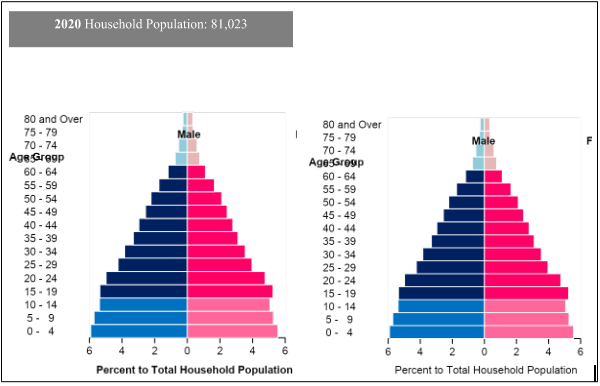
Moreover, there were more males (89.32%) than females (88.95%) among the 0 to 54 years old age group. Among the older age group (55 years old and over), males (10.68%) outnumbered the females (11.05%).
Table 1. Number and Percent to All Ages of Household Population and Sex Ratioby Selected Age Group: Kapalong, Davao del Norte, 2020

Sex Ratio
1. The sex ratio in the municipality of Kapalong was computed at 106 in 2020. This suggests that there were 106 males for every 100 females in the household population. (Table 1)
2. In 2020, children aged below 15 years old and those aged 15 to 64 years old had a sex ratio of 105 and 108 respectively. On the other hand, those aged 65 years old and over had a sex ratio of 95 males per 100 females. This depicts a longer life expectancy among females than males. (Table 1 and Figure 2)
Figure 2. Sex Ratio by Selected Age Group of Kapalong, Davao del Norte: 2020
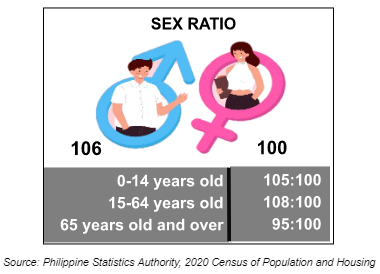
Median age
The median age of the population of the municipality of Kapalong is calculated at 23.6 years old, which means that half of the household population was younger than 23.6 years, while the other half is older than 23.6 years. This is higher than the median ages of 22.9 years and 22.2 years that were posted in 2015 and 2010, respectively. (Figure 3)
Figure 3. Median Age of Kapalong, Davao del Norte Population: 2020
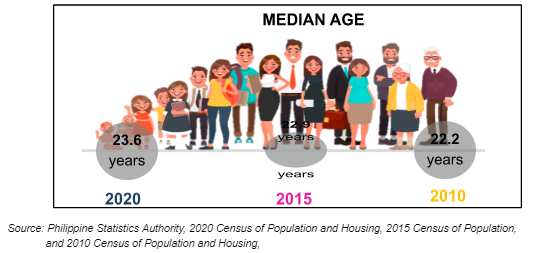
Dependency Ratio
The overall dependency ratio of the population of Kapalong, Davao del Norte was computed at 64, which indicates that for every 100 working-age or economically-active population, there were about 64 dependents (57 young dependents and 7 old dependents).
Table 2. Age Dependency Ratio of Household Population by Sex: Kapalong, Davao del Norte, 2020

There are more males than females in children under five years old
Children below five years old comprised 11.9 percent (9,646) of the household population in Kapalong. The sex ratio of the same age group was computed at 105 males per 100 females. (Table 1 and Figure 4)
Figure 4. Sex Ratio of Children under Five Years Old: Kapalong, Davao del Norte, 2020
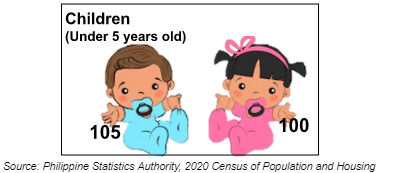
School-age Population
In 2020, the school-age population (5 to 24 years old) in Kapalong is recorded at 32,865 or 40.6 percent of the total household population.
Figure 5. Sex Ratio by Selected Age Group of Kapalong, Davao del Norte: 2020
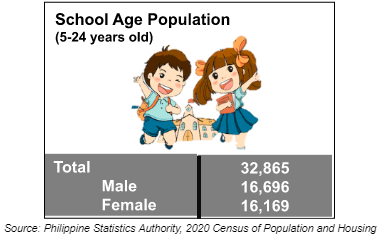
Senior Citizens among the household population
In the Philippines, people aged 60 years old and over are regarded as senior citizens. In Kapalong, they made up 7.4 percent (5,968) of the household population in 2020 in the same municipality. There were more males (50.28%) than females (49.72%) among the senior citizens in the same reference period. (Table 1 and Figure 6)
Figure 6. Sex Ratio by Selected Age Group of Kapalong, Davao del Norte: 2020
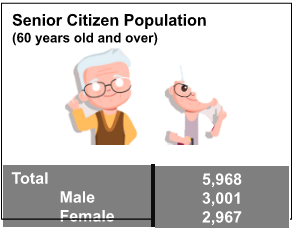
Reproductive age among the female population
Women of reproductive age (15 to 49 years old) in Kapalong totaled to 19,691 or 50.1 percent of the 39,292 female household population in the municipality in 2020. (Table 1)
Aging Index
In Kapalong, the aging index or the proportion of persons aged 60 years old and over per 100 persons under the age of 15 years old was computed at 21.3 percent in 2020. This means that, approximately, there is one person aged 60 years old and over for every five children under 15 years old.
Technical Notes
Household
A social unit consisting of person or a group of persons who sleep in the same housing unit and have a common arrangement in the preparation and consumption of food.
Household Population
This refers to all persons who are members of the household.
Sex Ratio
It is the number of males per one hundred females in population.
Median Age
It is the age that divides the population into two numerically equal groups; that is, half of the population are younger than this age and the other half are older.
Overall Dependency Ratio
It is the number of persons under 15 years old (young dependents) and persons aged 65 and older (old dependents) per one hundred persons 15 to 64 years old (working-age or economically-productive group) in a population.
Aging Index
It is calculated as the number of persons 60 years old and over per one hundred persons under the age of 15 years old.
